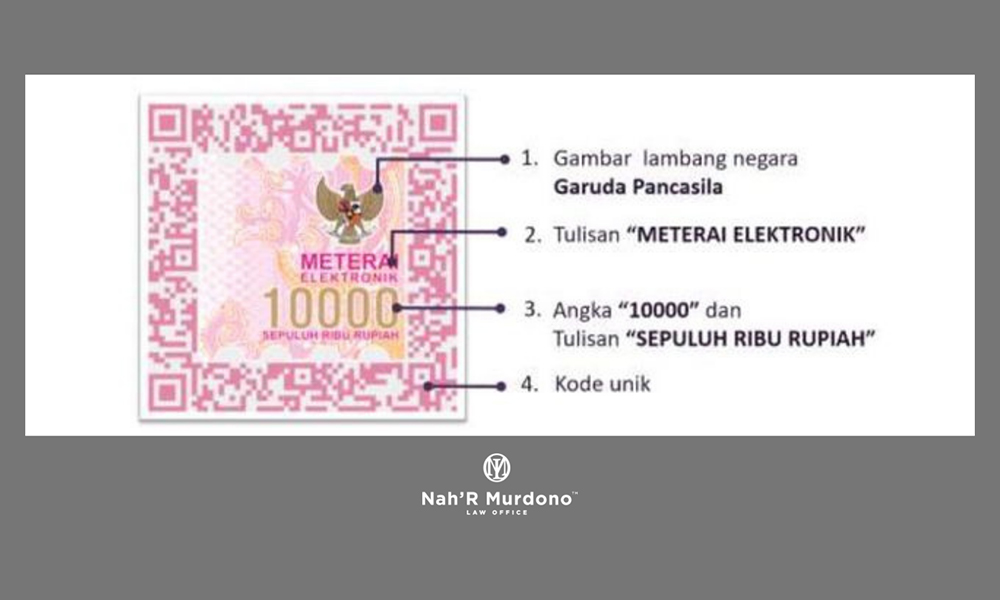Download Article
Enforcement of Electronic Stamp Duty based on Law No. 10 of 2020 and Regulation of the Minister of Finance No. 134/PMK.03/2021
I. Introduction
Along with the times, people have turned to digital transactions, including anything related to documents. Therefore, to accommodate this, Article 12 paragraph (2) letter (b) of Law Number 10 of 2020 (UU 10/2020), Indonesia introduces Electronic Stamp Duty, apart from the type of post-stamp that has been commonly used.
As a follow-up to the said Law 10/2020, a few days ago, the Minister of Finance of the Republic of Indonesia has officially launched and enforced the Electronic Stamp Duty or e-Stamp Duty. This coincides with the promulgation of Regulation of the Minister of Finance Number 134/PMK.03/2021 concerning Payment of Stamp Duty, General Characteristics and Special Features of Stamp Duty, Unique Codes and Certain Information on Electronic Stamp Duty, Stamp Duty in Other Forms, and Determination of the Validity of Stamp Duty, as well as Later Stamp Duty (PMK 123/2021).
II. Key Point
PMK 13/2021 explains that the affixing of Electronic Stamp Duty through the Electronic Stamp Duty System on dutiable documents. Furthermore, according to Article 7 PMK 13/2021 Electronic Stamp has a unique code in the form of a 22 (twenty-two) digit Seal serial number generated by the Electronic Stamp Duty System and certain information consisting of: (i) a picture of the state symbol, Garuda Indonesia; (ii) the words “ELECTRONIC STAMP DUTY”; and (iii) numbers and text indicating the Stamp Duty rate.
Suppose the payment of Electronic Stamp Duty is not possible due to the failure of the Electronic Stamp Duty System, in that case, payment of Stamp Duty can be made using Tax Payment Slip (Surat Setoran Pajak/SSP) by the Payable Party no later than 30 (thirty) calendar days from the time it is due.
III. Effects
With the existence of Electronic Stamp Duty, the Minister of Finance expects that it will support the increasing need for digital transactions. The Electronic Stamp Duty is specifically applied to electronic documents to make such electronic records usable as evidence in court.
The documents referred above, according to Article 3 paragraph (2) of Law 10/2020 includes: (i) agreement, certificates, statement letters, or any similar type of documents along with its copies; (ii) Notarial deeds and Deeds of the Land Deed Officer along with Grosse, copies and excerpts thereof; (iii) securities in any name and form; (iv) Securities transaction documents, including future contract transaction documents; and (v) tender documents in the form of excerpts, minutes, copies, and Grosse; (vi) Documents stating the amount of money with a nominal value of more than Rp 5 million describe the receipt of money and contain an acknowledgment that the debt has been fully or partially paid off; and (vii) other documents stipulated by Government Regulation. In addition, Law 10/2020 also regulates exemption facilities from the imposition of Stamp Duty, either temporarily or permanently, for the following matters:
(i) Documents on the transfer of land and building rights within a framework of accelerating the process of handling and restoring social conditions due to natural disasters; (ii) Document land and building rights solely for religious or non-commercial activities; (iii) Documents on the implementation Government programs and monetary or financial policies; and/or (iv) Documents related to the implementation of International Agreements based on binding international agreements or the principle of reciprocity.
IV. Transition Provision
With the enactment of Law 10/2020 and PMK 134/2021, Law Number 13 of 1985 (UU 13/1985) and Regulation of the Minister of Finance Number 4/PMK.03/2021 are officially repealed.
However, the Stamp Duty on dutiable documents made before January 1, 2021, will continue to follow the provision of Law 13/1985 and Stamp Duties printed based on the previous regulations can still be used for one year after the enactment of Law 10/2020 by affixing several stamp duties with the total amount is minimum of IDR 9,000.
This publication is intended for informational purposes only and does not constitute legal advice for specific issues, transactions, or matters. Any reliance on the material contained herein is at the reader’s own risk. Any process may reproduce no part of this publication without prior written permission MLO.





